1350 Years of Islamic Wars Against the West
The four centuries from 640 and 1240 C.E witnessed the total and definitive destruction of Judaism and Christianity in modern Saudi Arabia, and the decline of once flourishing Christian and Jewish communities in Palestine, Egypt, Syria, Mesopotamia, and Persia. In North Africa, the Christians had been virtually eliminated by 1240, and the Jews decimated. In these six centuries witnessed a dramatic demographic reversal whereby the Arab-Muslim minority developed into a dominant majority, resorting to oppression in order to reduce the indigenous populations to tolerated religious minorities. Growth of Islam World Maps EARLY ISLAM EXPANSION MAP  (Area of Islam at birth 622-632, Area of Islam Expansion 632-661, Area of Islam Expansion 661-750. ----> Military Campaigns.) ISLAMIC OTTOMAN EMPIRE 1580  ISLAMIC WORLD MAP TODAY  (Light Green States Under Sunni Muslim Control Dark Green Shia Muslim Controlled States) The Crusades were in every way defensive wars. They were a direct response to Muslim aggression—an attempt to turn back or defend against Muslim conquests of Christian lands. 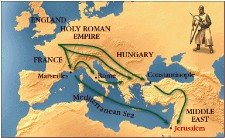 Christians in the eleventh century were not paranoid fanatics. Muslims really were gunning for them. While Muslims can be peaceful, Islam was born in war and grew the same way. From the time of Mohammed, the means of Muslim expansion was always the sword. Muslim thought divides the world into two spheres, the Abode of Islam and the Abode of War. Christianity—and for that matter any other non-Muslim religion—has no abode. Christians and Jews can be tolerated within a Muslim state under Muslim rule. But, in traditional Islam, Christian and Jewish states must be destroyed and their lands conquered.  When Mohammed was waging war against Mecca in the seventh century, Christianity was the dominant religion of power and wealth. As the faith of the Roman Empire, it spanned the entire Mediterranean, including the Middle East, where it was born. The Christian world, therefore, was a prime target for the earliest caliphs, and it would remain so for Muslim leaders for the next thousand years.  With enormous energy, the warriors of Islam struck out against the Christians shortly after Mohammed’s death. They were extremely successful. Palestine, Syria, and Egypt—once the most heavily Christian areas in the world—quickly succumbed. By the eighth century, Muslim armies had conquered all of Christian North Africa and Spain. In the eleventh century, the Seljuk Turks conquered Asia Minor (modern Turkey), which had been Christian since the time of St. Paul.  The old Roman Empire, known to modern historians as the Byzantine Empire, was reduced to little more than Greece. In desperation, the emperor in Constantinople sent word to the Christians of western Europe asking them to aid their brothers and sisters in the East. That is what gave birth to the Crusades. They were not the brainchild of an ambitious pope or rapacious knights but a response to more than four centuries of conquests in which Muslims had already captured two-thirds of the old Christian world. At some point, Christianity as a faith and a culture had to defend itself or be consumed by Islam. The Crusades were that defense. 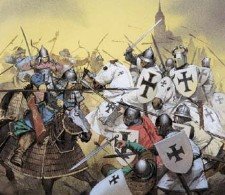 The First Crusade was a long shot. There was no leader, no chain of command, no supply lines, no detailed strategy. It was simply thousands of warriors marching deep into enemy territory, committed to a common cause. Many of them died, either in battle or through disease or starvation. It was a rough campaign, one that seemed always on the brink of disaster. Yet it was miraculously successful. By 1098, the Crusaders had restored Nicaea and Antioch to Christian rule. In July 1099, they conquered Jerusalem and began to build a Christian state in Palestine. The joy in Europe was unbridled. It seemed that the tide of history, which had lifted the Muslims to such heights, was now turning. 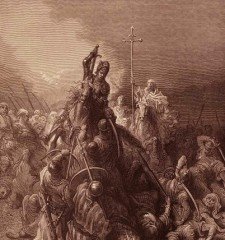 When we think about the Middle Ages, it is easy to view Europe in light of what it became rather than what it was. The colossus of the medieval world was Islam, not Christendom. The Crusades are interesting largely because they were an attempt to counter that trend. But in five centuries of crusading, it was only the First Crusade that significantly rolled back the military progress of Islam. It was downhill from there. When the Crusader County of Edessa fell to the Turks and Kurds in 1144, there was an enormous groundswell of support for a new Crusade in Europe. It was led by two kings, Louis VII of France and Conrad III of Germany, and preached by St. Bernard himself. It failed miserably. Most of the Crusaders were killed along the way. Those who made it to Jerusalem only made things worse by attacking Muslim Damascus, which formerly had been a strong ally of the Christians. 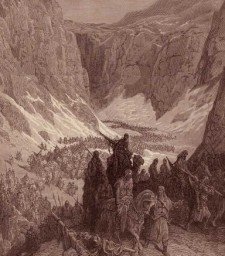 In the wake of such a disaster, Christians across Europe were forced to accept not only the continued growth of Muslim power but the certainty that God was punishing the West for its sins. Lay piety movements sprouted up throughout Europe, all rooted in the desire to purify Christian society so that it might be worthy of victory in the East. Crusading in the late twelfth century, therefore, became a total war effort. Every person, no matter how weak or poor, was called to help. Warriors were asked to sacrifice their wealth and, if need be, their lives for the defense of the Christian East. On the home front, all Christians were called to support the Crusades through prayer, fasting, and alms. Yet still the Muslims grew in strength. Saladin, the great unifier, had forged the Muslim Near East into a single entity, all the while preaching jihad against the Christians.  In 1187 at the Battle of Hattin, his forces wiped out the combined armies of the Christian Kingdom of Jerusalem and captured the precious relic of the True Cross. Defenseless, the Christian cities began surrendering one by one, culminating in the surrender of Jerusalem on October 2. Only a tiny handful of ports held out. The response was the Third Crusade. It was led by Emperor Frederick I Barbarossa of the German Empire, King Philip II Augustus of France, and King Richard I Lionheart of England. By any measure it was a grand affair, although not quite as grand as the Christians had hoped. The aged Frederick drowned while crossing a river on horseback, so his army returned home before reaching the Holy Land. 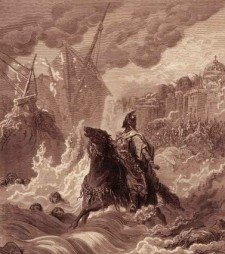 Philip and Richard came by boat, but their incessant bickering only added to an already divisive situation on the ground in Palestine. After recapturing Acre, the king of France went home, where he busied himself carving up Richard’s French holdings. The Crusade, therefore, fell into Richard’s lap. A skilled warrior, gifted leader, and superb tactician, Richard led the Christian forces to victory after victory, eventually reconquering the entire coast. But Jerusalem was not on the coast, and after two abortive attempts to secure supply lines to the Holy City, Richard at last gave up. Promising to return one day, he struck a truce with Saladin that ensured peace in the region and free access to Jerusalem for unarmed pilgrims. But it was a bitter pill to swallow. The desire to restore Jerusalem to Christian rule and regain the True Cross remained intense throughout Europe. 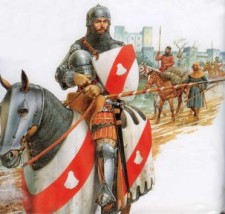 The Crusades of the 13th century were larger, better funded, and better organized. But they too failed. The Fourth Crusade (1201-1204) ran aground when it was seduced into a web of Byzantine politics, which the Westerners never fully understood. They had made a detour to Constantinople to support an imperial claimant who promised great rewards and support for the Holy Land. Yet once he was on the throne of the Caesars, their benefactor found that he could not pay what he had promised.  Thus betrayed by their Greek friends, in 1204 the Crusaders attacked, captured, and brutally sacked Constantinople, the greatest Christian city in the world. Pope Innocent III, who had previously excommunicated the entire Crusade, strongly denounced the Crusaders. But there was little else he could do. The tragic events of 1204 closed an iron door between Roman Catholic and Greek Orthodox, a door that even today Pope John Paul II has been unable to reopen. It is a terrible irony that the Crusades, which were a direct result of the Catholic desire to rescue the Orthodox people, drove the two further—and perhaps irrevocably—apart.  The remainder of the 13th century’s Crusades did little better. The Fifth Crusade (1217-1221) managed briefly to capture Damietta in Egypt, but the Muslims eventually defeated the army and reoccupied the city. St. Louis IX of France led two Crusades in his life. The first also captured Damietta, but Louis was quickly outwitted by the Egyptians and forced to abandon the city. Although Louis was in the Holy Land for several years, spending freely on defensive works, he never achieved his fondest wish: to free Jerusalem. He was a much older man in 1270 when he led another Crusade to Tunis, where he died of a disease that ravaged the camp. After St. Louis’s death, the ruthless Muslim leaders, Baybars and Kalavun, waged a brutal jihad against the Christians in Palestine.  By 1291, the Muslim forces had succeeded in killing or ejecting the last of the Crusaders, thus erasing the Crusader kingdom from the map. Despite numerous attempts and many more plans, Christian forces were never again able to gain a foothold in the region until the 19th century. Muslim kingdoms were becoming more, not less, powerful in the 14th, 15th, and 16th centuries. The Ottoman Turks conquered not only their fellow Muslims, thus further unifying Islam, but also continued to press westward, capturing Constantinople and plunging deep into Europe itself. 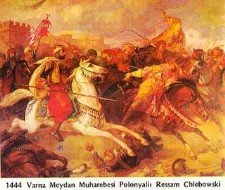 By the 15th century, the Crusades were no longer errands of mercy for a distant people but desperate attempts of one of the last remnants of Christendom to survive. Europeans began to ponder the real possibility that Islam would finally achieve its aim of conquering the entire Christian world. Of course, that is not what happened. But it very nearly did. In 1480, Sultan Mehmed II captured Otranto as a beachhead for his invasion of Italy. Rome was evacuated. Yet the sultan died shortly thereafter, and his plan died with him. In 1529, Suleiman the Magnificent laid siege to Vienna. If not for a run of freak rainstorms that delayed his progress and forced him to leave behind much of his artillery, it is virtually certain that the Turks would have taken the city. Germany, then, would have been at their mercy. 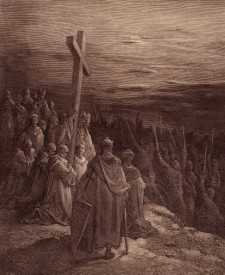 Yet, even while these close shaves were taking place, something else was brewing in Europe—something unprecedented in human history. The Renaissance, born from a strange mixture of Roman values, medieval piety, and a unique respect for commerce and entrepreneurialism, had led to other movements like humanism, the Scientific Revolution, and the Age of Exploration. Even while fighting for its life, Europe was preparing to expand on a global scale.  The Protestant Reformation, which rejected the papacy and the doctrine of indulgence, made Crusades unthinkable for many Europeans, thus leaving the fighting to the Catholics. In 1571, a Holy League, which was itself a Crusade, defeated the Ottoman fleet at Lepanto. Yet military victories like that remained rare.  The Muslim threat was neutralized economically. As Europe grew in wealth and power, the once awesome and sophisticated Turks began to seem backward and pathetic—no longer worth a Crusade. The "Sick Man of Europe" limped along until the 20th century, when he finally expired, leaving behind the present mess of the modern Middle East. From the safe distance of many centuries, it is easy enough to scowl in disgust at the Crusades. Religion, after all, is nothing to fight wars over. But we should be mindful that our medieval ancestors would have been equally disgusted by our infinitely more destructive wars fought in the name of political ideologies. And yet, both the medieval and the modern soldier fight ultimately for their own world and all that makes it up. Both are willing to suffer enormous sacrifice, provided that it is in the service of something they hold dear, something greater than themselves. Whether we admire the Crusaders or not, it is a fact that the world we know today would not exist without their efforts. The ancient faith of Christianity, with its respect for women and antipathy toward slavery, not only survived but flourished. Without the Crusades, it might well have followed Zoroastrianism, another of Islam’s rivals, into extinction.  Zoroastrianism was founded in the 6th century (600 years before Christ) by the Persian prophet Zoroaster; at the time of Buddha. It was the official religion of the Persian Empire until it was conquered by Alexander the Great in 330 after Christ... if the battles at Marathon and Salamis would have been won by the Persians, today we would have probably in the Western civilization Zoroastrianism, instead of Christianity... finally the Muslims defeated them in the 7th century AC. The Zoroastrians were scattered, and today there are left 115,000 around Bombay, in India, and 7,000 in the United States. Zoroastrianism was thus the first to teach clearly the doctrines of an individual judgment, Heaven and Hell, the future resurrection of the body, the general Last Judgment, and life everlasting for the reunited soul and body. These doctrines were to become familiar articles of faith to much of mankind, through borrowings by Judaism, Christianity and Islam.  In 1870 when the French were forced to fight a country which just a few years earlier had been a disorganized clutter of rag-tag mini-states ruled by comic opera princes. The land of Napoleon was rated by every armchair general as the mightiest military force on the Continent. But France lost. Its army was chopped up like ground round. Its glorious capital, Paris, faced the humiliation of a foreign army marching down its streets. The upstart nation that had brought France to its knees was... Germany. An equally surprising fate occurred to England when it trained its guns on the superpowers of its day in two world wars. When the smoke had cleared, two backward nations of Johnny-come-latelies ended up dominating the world. These countries, whose inhabitants had usually been regarded as just one small step above the primitive, were The United States and Russia. Today's superpower is tomorrow's conquered state. Yesterday's overlooked mob is often the ruler of tomorrow. Never underestimate the third world. Never be complacent about barbarians.  Certain Islamic societies tend to be high on this list. On November 28, 1943, Franklin Roosevelt met secretly with Joseph Stalin and Winston Churchill in Iran. When Roosevelt returned home, he sent a telegram to the Shah thanking the Iranian ruler for his hospitality. The President explained that he'd noticed the hills in Iran were bare. American agronomists had learned to prevent soil erosion and enrich the landscape by planting trees on slopes like these. Roosevelt suggested an experimental tree-planting program. The Iranian leader thanked FDR. But privately the young potentate was highly insulted: According to Moslem standards, the gift demeaned his virility. Stalin was far more understanding of Mohammedan culture. He offered the Shah tanks and planes. 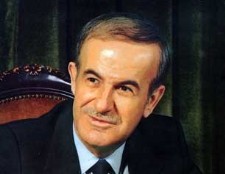 Hafez al-Assad, father of the current leader of Syria, worked hard to solidify his position as the country's undisputed ruler. He didn't do it by selling Syria's citizens on the values of his political platform. Instead, he slaughtered 20,000 Moslem Fundamentalists who opposed him.  According to The New York Times, in 1980 Yasir Arafat, the Palestinian leader, had a Lebanese imam (a holy man roughly equivalent to a pastor) shot in the head for refusing to preach the propaganda of the PLO. Then Arafat visited the imam's Lebanese home, took his ten-year-old son aside, explained to the little boy that his father had been murdered by the Israelis, handed the lad a gun, and said, "When you grow up, use this to take revenge." Arafat wanted the boy to be a killer. Holiness, righteousness, and even day-to-day propriety in Islamic cultures are based on the example of Mohammed. Though Islamic literature praises Mohammed as a man of peace, he was also a military leader. 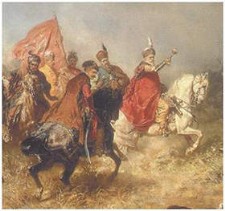 In 624 AD, The Prophet announced the concept of the Jihad--the holy war. He said in the blessed book, The Koran, "I will instill terror into the hearts of the unbelievers: smite ye above their necks and smite all their finger-tips off them. ...And slay them wherever ye catch them...." In the next nine years, the man of peace ordered a minimum of 27 military campaigns. He personally led nine of them.  It is not surprising that Moslem jurists would later declare that there are two worlds: the world of Islam--Dar al-Islam--and the non-Islamic world--Dar al-Harb. These two territorial spheres, explained the Moslem scholars, are in a state of perpetual war. According to some Koranic interpreters, any leader who fails to "make wide slaughter" in the land of the infidel is committing a sin. A statesman is only allowed the temporary expedient of peace if his forces are not yet strong enough to win. This may explain why Elias Canetti, in his Nobel Prize-winning book Crowds and Power, calls Islam a killer religion, literally "a Religion of War."  In reality, Islam, like most other religions, has both its positive and its negative sides. It imposes a host of admirable responsibilities on its adherents: for example, zakat, the presentation of regular, substantial contributions to the poor. Allah also demands that his followers "give glad tidings to those who believe and work righteousness," "cover not Truth with falsehood nor conceal the Truth when ye know (what it is)," and "treat with kindness your parents and kindred and orphans and those in need." However, Allah issues many a darker order as well. And the percentage of modern Islamic adherents who have focused on Allah's calls to combat is dismaying. Today, the descendants of the Persians who fought the Greeks in 480 BC are devout Moslems. In the '30s, one of them labored diligently to become an Islamic scholar. He pored over the Koran for years. As he demonstrated his superior knowledge of Allah's pronouncements, he rose in the ranks of Iranian holy men. Finally he achieved the penultimate title--ayatollah (roughly equivalent to a Catholic cardinal).  His name was Ruhollah Khomeini, and he wrote books, pamphlets, and even taped and distributed his speeches to inspire the citizens of Iran with sacred virtue. The ayatollah's words roused Iranians to overthrow the shah and usher in a government based on strict Islamic doctrine. What did the ayatollah's pronouncements say- Among other things, that infidels are like dogs. Their existence is an affront to Allah. Here's how the ayatollah himself put it: "...Moslems have no alternative... to an armed holy war against profane governments. ...Holy war means the conquest of all non-Moslem territories. ...It will ...be the duty of every able-bodied adult male to volunteer for this war of conquest, the final aim of which is to put Koranic law in power from one end of the earth to the other. "The leaders of the USSR and of England and the president of the United States are ...infidels.... ... Every part of the body of a non-Moslem individual is impure, even the hair on his head and his body hair, his nails, and all the secretions of his body. Any man or woman who denies the existence of God, or believes in His partners [the Christian Trinity], or else does not believe in His Prophet Mohammed, is impure (in the same way as are excrement, urine, dog, and wine)[sic]."  Concluded the Ayatollah, "Islam does not allow peace between... a Moslem and an infidel." Though many of us imagine that the promotion of harmony is a prime objective of every major world faith, the ayatollah disagreed. "The leaders of our religion were all soldiers, commanders and warriors," he wrote, "...they killed and they were killed." The concept of a peaceful prophet was so alien to the ayatollah that he was convinced Christ's message had been deliberately distorted by Westerners. Said Khomeini, "This idea of turning the other cheek has been wrongly attributed to Jesus (peace be unto him); it is those barbaric imperialists that have attributed it to him. Jesus was a prophet, and no prophet can be so illogical." Khomeini's dicta may seem irrelevant now that he has long been dead, but his words have actually gained in influence since his demise. Early in the '90s, Iraq's humiliation in the Gulf War undermined the credibility of the secular Moslem regimes, leaving a power vacuum into which Fundamentalism leaped. There are currently roughly 100,000,000 Islamic fundamentalists (rechristened "Islamic revivalists" by some scholars ).  Activists among them, employing the slogan "Africa for Islam," are making diligent--and often violent--efforts to seize power in numerous sub-Saharan states. They have gained sufficient favor with South Africa's ANC that Nelson Mandela, in a 1992 visit to Teheran, told the Iranians that Africa must be reshaped along the lines of the Iranian revolution. (Ironically, when South African leader Bishop Desmond Tutu gave a speech to a Palestinian crowd in 1989 lauding Palestinian interests, he failed to realize that the Arabic banners carried by his listeners read "On Saturday We Will Kill the Jews, on Sunday We Will Kill the Christians!") Khomeini-style fundamentalists have become vigorous political forces in areas like China's Sinkiang region (where as of 1994, Beijing officials were seriously concerned that the area's inhabitants, influenced by propaganda from Iran, would attempt to break away and found a fundamentalist Islamic republic).  Islamic fundamentalists have been involved in the Indian state of Kashmir's vicious civil war. They've been active in Malaysia, Thailand (where Moslem guerilla forces were fighting in 1993), and the Sudan (where an Iranian-backed fundamentalist regime is engaged in a campaign to subjugate, exterminate or--according to the United Nations International Labor Organization--literally enslave the black Christians and animists in the southern region of the country). Followers of Khomeini have been moving aggressively in Algeria, Jordan, Tunisia, Lebanon, Kuwait, Pakistan, Afghanistan, Azerbaijan, Turkmenistan (where by 1992 posters and portraits of the ayatollah had become a particularly strong sales item in local stores), France, and, according to Greek Defense Minister Ioannis Varitsiotes and the University of Belgrade's Dragoljub R. Zivojinovic, Czechoslovakia, Albania and Yugoslavia. In many of these cases, fundamentalists are sweeping elections, manipulating generals, funding insurrections, sponsoring terrorism, or actually taking control. Islamic fundamentalists have poured money into America's black communities in an effort that has brought more than a million U.S. African Americans over to the one true faith.  While most of these converts remain peaceful, Al-Fuqra, a predominantly African-American Islamic group under the leadership of Pakistani Sheikh Mubarak Ali Jilani Hashemi, has declared a jihad in North America, and, according to law enforcement agencies, has been involved in bombings, murders and other forms of bloodshed in Colorado, Arizona, Pennsylvania and Canada. It has been reported that Al-Fuqra also had a hand in the 1993 effort to blow up New York's United Nations building, the city's FBI headquarters, and its Holland and Lincoln Tunnels. When the Iranians declared a death-sentence on British author Salman Rushdie, black American imams everywhere from Brooklyn to Los Angeles enthusiastically supported the move. (So did the Moslem head of UCLA's Middle Eastern Studies Department.) Even a loyal African-American Gulf War veteran, won over to Allah in 1991, stated after his change in faith that "soon it [Islam] will take over all of America, then the world." The U.S. African-American community is only a beachhead. Islamic forces have been attempting to gain control of U.S. media outlets in the hope of using them as propaganda tools for the Moslem point of view.  The Saudis and America's Christian fundamentalists battled in the early '90s for the right to purchase America's second largest wire service, UPI. Ultimately, the Arabs won. In addition, Amal Adam, the former head of Saudi Arabia's equivalent of the CIA, was the primary backer of a British-based firm called Capcom, whose chief officers were the heads of TCI (Telecommunications Incorporated), America's largest player in the cable television game. In 1993, TCI made headlines when it came within a hair's breadth of merging with Bell/Atlantic. Had the effort succeeded, it would have formed what financial analysts universally heralded as one of the giants of the coming interactive media revolution, giving the Saudis additional leverage for American media manipulation. The ground is ripe for worldwide Islamic fundamentalist expansion. Mohammedanism is currently the fastest-growing religion on the planet. There are a billion Moslems--as many as Jews and Christians combined--and that number is increasing daily. According to Cairo University's Professor Ali Dessouki , 50 countries are now Islamic.  What's more, there are massive Mohammedan populations everywhere from Nigeria to Mongolia, the former Soviet Central Asian republics, Southeast Asia, and the Philippines. The countries with the world's largest Islamic bodies of citizenry are not even parts of the Arab world--they are Indonesia and China. To top it off, Islamic public opinion, if the Arabs, Iranians and Pakistanis are an accurate barometer, is virulently anti-American. Today's Islam extremism is the perfect example of a meme grown ravenous. Saddam Hussein, in his 1990 drive for expansion, claimed to be following Allah's message. The late General Mohammad Zia ul-Haq, former head of Pakistan, who masterminded the fundamentalist-led Afghan resistance efforts using U.S. funds, kept a map in his office with all Iran, Pakistan, Afghanistan and Soviet Central Asia marked in green. It was the symbol of his ultimate ambition--unified Moslem rule extending through every green-marked territory.  In 1990, one enthusiastic Turkish official, minister of state Ercument Konukman, noted the substantial Turkish populations in the former Soviet Union and China, and looked forward to uniting them "under the colors of the Turkish flag." A fundamentalist clergyman in Lebanon says, "Don't believe that we want an Islamic republic in Lebanon. ...What Hezbollah wants is a world Islamic republic." Cairo constitutional lawyer Dr. A.K. Aboulmagd adds, "I even venture sometimes to say that Islam was not meant to serve the early days of Islam, when life was primitive and when social institutions were still stable and working. It was...meant to be put in a freezer and to be taken out when it will be really needed. And I believe that the time has come. ...The mission of Islam lies not in the past, but in the future."  The Crusader states were not planted on undisputed Moslem land. The heartland of the Islamic empire, the section bordering the Mediterranean rim, was a deeply Christian area, a vital spiritual and economic core of a "Western" imperium which, for over six hundred years before Mohammed's birth, had included the non-Arab provinces of Turkey (known then as Asia, Galatia, Bithynia, Pontus and Cappadocia--where St. Paul established many of the first churches), Syria (whose city of Damascus was one of the earliest major Christian centers), Israel (homeland to the Jews since roughly 1,200 B.C., and, despite Roman efforts to expel the native population, still dotted with Hebrew villages when the Moslems arrived sword in hand), Egypt (populated at the time by rabidly Christian descendants of the pyramid-builders, along with significant numbers of Greeks and Jews), Libya (the former Cyrenaica), Tunisia (Carthage and its environs, where St. Augustine was born and eventually became bishop of Hippo), and Northern Algeria and Morocco (then called Mauritania). These were the countries that had produced the Bible, the Christian monastic movement (born in Egypt), St. Jerome's conversion (in what is now Turkey), St. John of Damascus, the famed early church historian Bishop Eusebius of Caesarea, Origen, Saint Athanasius, the Aryan heresy, a significant number of fathers of the Roman Catholic faith and the Eastern Orthodox creed. The knights of the cross did not retain their reconquered kingdoms long. They took Jerusalem in 1099 and were expelled by 1187.  Nonetheless, according to historian Amin Maalouf, the author of The Crusades Through Arab Eyes, modern Arabs tend to see today's world events as a continuation of the Crusades. For 600 years after the fall of the Crusader states, Islamic forces returned to the attack, capturing Greece and chunks of Eastern Europe, raiding towns in Sicily and the Italian coasts for goods and slaves, preying on Mediterranean shipping, chaining Europeans like Miguel Cervantes to the oars of their galleys, and until 1826 forcing the Christian citizens of Yugoslavia and Albania to give up their children to Moslem overlords (who brought up the males on the Koran, then turned them into soldiers known as Janissaries). It wasn't until 1798 that Napoleon began to shift the balance between East and West again when he briefly invaded Egypt, from which he was ignominiously expelled by the British and the Turks. But the heavy-handed fertile crescent "imperialism" so resented by the Arabs didn't begin until after the First World War, and it lasted less than 40 years. Southern Spain remained under the Moslem yoke for 781 years, Greece for 381, and pieces of longtime Christian terrain like St. Augustine's North African homeland and the religious and secular capital that eventually eclipsed Rome in power and splendor--Byzantium--are still in Moslem hands today. Syria, on the other hand, was only under western control for 21 years, Egypt for 67, and Iraq a mere 15.  If one accepts Esposito's reasoning, Westerners--who were bludgeoned by "an expansive imperial" Islam for well over a millennium--have more right to fear an Islamic revival than Moslems have to hate the West. More to the point, Phebe Marr, of the National Defense University's Institute for Strategic Studies, contends that militant extremist groups dedicated to violence and an absolute rejection of the West are small. In addition, "The radicals do not have a broad base of popular support. ...Even in Lebanon, however, where such groups flourish, a poll of university students taken in 1987 indicated that more than 90% disapproved of...assassinations, hostage taking, and sabotage of government installations." The ayatollah wrote, "Any nonreligious [i.e. non-Islamic] power, whatever form or shape, is necessarily an atheistic power, the tool of Satan; it is part of our duty to stand in its path and to struggle against its effects. Such Satanic power can engender nothing but corruption on earth, the supreme evil which must be pitilessly fought and rooted out.  To achieve that end, we have no recourse other than to overthrow all governments that do not rest on pure Islamic principles, and are thus corrupt and corrupting, and to tear down the traitorous, rotten, unjust, and tyrannical administrative systems that serve them.... If Islamic civilization had governed the West, we would no longer have to put up with these barbaric goings-on unworthy even of wild animals....[Western governments are] using inhuman laws and inhuman political methods... Misdeeds must be punished by the law of retaliation: cut off the hands of the thief; kill the murderer instead of putting him in prison; flog the adulterous woman or man. Your concerns, your 'humanitarian' scruples, are more childish than reasonable." Khomeini had a prescription for such problems: "All of humanity must strike these troublemakers [the governments of the West] with an iron hand.... Islam has obliterated many tribes because they were sources of corruption [i.e. sources of non-Islamic influence]...." Judging from the Ayatollah's rhetoric, the next tribes he would have liked to see obliterated were those in Europe and America. Allah is rapidly providing Khomeini's followers with a sword to carry out their master's wishes. He has offered Islam the fire in which the Koran says those who follow false faiths are destined to burn: nuclear weaponry. He has also provided the long range missiles needed to use it. According to the late imam's logic, there may be only one just and righteous thing to do: employ this technology to wipe out recalcitrant heathens like you and me.  (Green areas Islamic controlled Africa) The modern growth of Islam is the coalescence of a superorganism drawn together by the magnetic attraction of a meme. But this meme has an advantage: The social body it is trying to pull together has existed as a unified social beast in the past. The old reflexes of solidarity are still there, waiting to be aroused. What is a Meme? (An idea, thought or piece of information that is passed from generation to generation through imitation and behavioral replication. Coined by Richard Dawkins in his 1976 book "The Selfish Gene," memes and memetics are the cultural counterpart to the biological study of genes and genetics. Using the evolution analogy, Dawkins observed that human cultures evolve via "contagious" communications in a manner similar to the gene pool of populations over time.) The meme of the new Islam is not laboring to generate a small and fragile embryo. It is simply attempting to awaken a sleeping giant. Videos ... *Radical Islam's War Against The West Video1 *Radical Islam's War Against The West Video2  Labels: Armageddon, Bible Prophecy, Bush Brotherhood of Death  Stumble It! Stumble It! |









































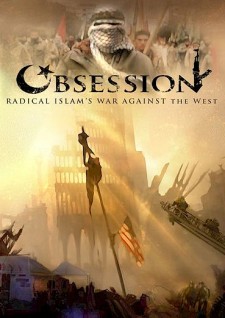






Comments on "1350 Years of Islamic Wars Against the West"
post a comment